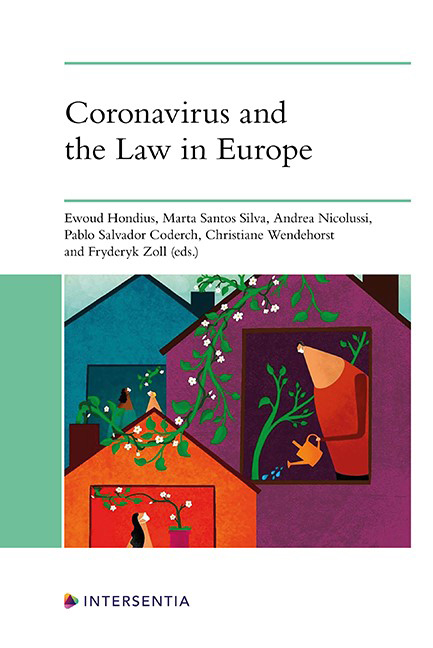Book contents
- Frontmatter
- Preface
- Contents
- List of Keywords
- List of Contributors
- PART I COVID-19 AND FUNDAMENTAL RIGHTS
- PART II STATES AGAINST THE PANDEMIC
- PART III COMPENSATION FOR COVID-19 RELATED DAMAGE
- PART IV CONTRACT LAW
- PART V CONSUMER LAW
- PART VI LABOUR AND SOCIAL LAW
- PART VII CORONAVIRUS CHANGING EUROPE
- Epilogue
- Annex: ELI Principles for the COVID-19 Crisis
- About the Editors
Legal Measures as the Response to an Extraordinary Situation in the Slovak Republic
Published online by Cambridge University Press: 10 December 2021
- Frontmatter
- Preface
- Contents
- List of Keywords
- List of Contributors
- PART I COVID-19 AND FUNDAMENTAL RIGHTS
- PART II STATES AGAINST THE PANDEMIC
- PART III COMPENSATION FOR COVID-19 RELATED DAMAGE
- PART IV CONTRACT LAW
- PART V CONSUMER LAW
- PART VI LABOUR AND SOCIAL LAW
- PART VII CORONAVIRUS CHANGING EUROPE
- Epilogue
- Annex: ELI Principles for the COVID-19 Crisis
- About the Editors
Summary
This contribution deals with norm-making as the substantial response to an extraordinary situation caused by coronavirus, with regard to the development of law in the Slovak Republic. The contribution describes the proliferation of normative acts, such as softlaw of the executive (recommendations), measures of the executive of a normative nature (prohibitions, obligations) and responses of the parliament (ad hoc COVID-19 acts). The contribution also deals with the judicial reaction. It argues that the presence of lawyers in crisis committees would ensure the respect of basic law-making principles such as human rights, adherence to procedures, constitutionality and would contribute to the sustainability of new norms.
INTRODUCTION
For the first time, we are faced with a special situation that affects everyone, not only in the Slovak Republic, or the European Union. All essential social relations are regulated by law, i.e. the eventuality of an extraordinary situation is known to the law and there are legal tools to manage and overcome it, or to regulate the functioning of society and the State in such a situation. All measures that “follow” this extraordinary situation have a primary goal to protect health and a secondary goal to mitigate the consequences and to renew standard relations.
It can be stated that special, new and urgent conditions mobilise legislative solutions, i.e. norm-making is activated. Of course, legislation is of fundamental importance for achieving the long-term goals. However, to solve new and acute problems, legislation is the fastest and the most operational solution with the most general impact, even though the legislative process also takes time.
The extraordinary situation of a global nature has shown that the first bodies to respond to the situation in a strictly normative way were neither global organisations, nor individuals, nor association, but the States. The experience in the Slovak Republic has shown the following course. The reality of the extraordinary situation first began to manifest itself regionally. As a result, cities, municipalities and self-governing regions, as well as various bodies were first to react. Nevertheless, the need for a nationwide resolution was quickly noticed. Normative reactions at the State level came in a form of “soft-norm-making”. Various recommendations were published – mainly in the form of information leaflets for the general public against the spread of infection. This was followed by normative actions of the government.
- Type
- Chapter
- Information
- Coronavirus and the Law in Europe , pp. 243 - 262Publisher: IntersentiaPrint publication year: 2021



